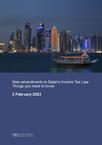
New amendments to Qatar's Income Tax Law
It is expected that an amendment of the Executive Regulations of Income Tax Law will be released soon accordingly.
Things you need to know:
Global minimum tax rate of 15%
Considering the roadmap for the implementation of the Pillar 2 solution of the Global Anti Base Erosion Model Rules (GloBE) of the OECD and G-20, the New Tax Law shall include Minimum Global Tax. The detailed provision in relation to the application of Global Minimum Tax shall be covered by the amended Executive Regulations to the New Tax Law. The amendments shall include measures to achieve minimum effective tax rate of 15% for in-scope entities.
Changes in the scope of income tax
- Change of certain types of foreign income as taxable
This shall include income generated from real estate, immovable property, dividends, royalties, interest, and technical service fees provided such categories of income are not attributable to a foreign permanent establishment of a Qatari Project.A new article of the law specifies that dividends paid to a Qatari project for its businesses outside Qatar shall not be subject to tax in Qatar provided the same business results were taxed in the foreign country. - Tax exempt status for private associations and foundations, private charitable organizations, and private foundations of public interest
These were excluded from the scope of Income Tax Law as per article (2) of Law No. (24) of 2018. However, the new Tax Law No. (11) of 2022 have brought private associations and foundations, private charitable organizations, and private foundations of public interest within the scope of the Tax Law as exempt entities based on Article no. (4) of the Tax Law. Accordingly, these entities shall now be considered as within the scope of the Tax Law as tax-exempt entities and comply to tax obligations such as tax registration, filing of tax returns, etc. - New definitions introduced in the amendments:
The amendments have introduced several new and amended definitions such as “person”, “project”, “Qatari project”, “foreign project”, “business”, “permanent establishment”, “immovable properties”, “dividends”, “interest”, “technical fees”, “perfect competition”, “foreign tax”, “actual place of administration”, etc. which aid in the interpretation on the new provisions introduced in the amendments as well as clarifies some provisions prevailing in the previous Tax Law.
Reporting obligations
- Economic Substance Requirement ("ESR")
A new article introduced a new requirement for entities meeting certain criteria to submit a report to the GTA requirement.Entities not meeting criteria or failed to report the proper ESR files to the GTA will be considered not performing core activities in the State of Qatar and no tax residency certificate would be issued for such entity.Flat penalty of an amount equal to 15% of net income is included in the Article 24 of the Tax Law for the cases where the economic substance requirement is not complied by the entities under obligation. - Ultimate Beneficial Ownership ("UBO")
A new article introduced a new requirement for companies and other taxpayers to submit to the GTA upon request all information about the direct and ultimate beneficial owners.
Other changes
- Changes to residency criteria
Any individual holding Qatari Nationality is now considered as resident in the State of Qatar.Companies / other forms of taxpayers incorporated in the state are considered resident as long as the actual and effective place of management and administration is in the state. - Changes to the Anti-Avoidance rules
By the new Tax Law, GTA has more rights to challenge any arrangements with an intention to avoid payment of tax and apply the necessary tax adjustment accordingly.
If you require any information regarding the New Income Tax Law, please don’t hesitate to contact us.

